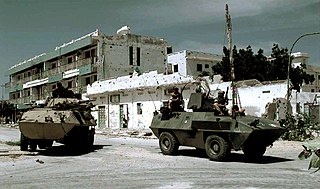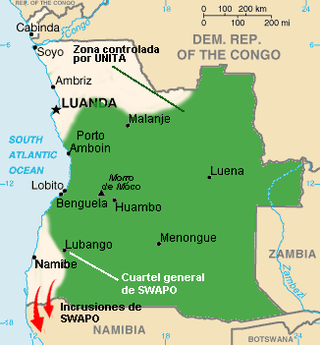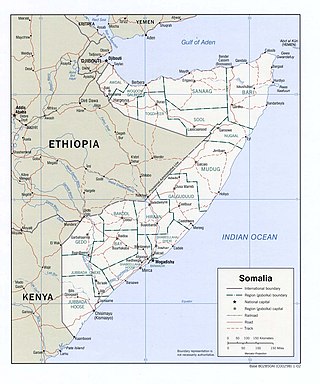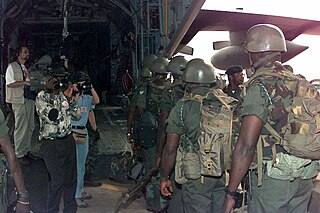
United Nations Security Council resolution 794, adopted unanimously on 3 December 1992, after reaffirming resolutions 733 (1992), 746 (1992), 751 (1992), 767 (1992) and 775 (1992), the Council "[expressed] grave alarm" regarding the situation in Somalia and authorised the creation of the Unified Task Force (UNITAF) to create a "secure environment for humanitarian relief operations in Somalia" in order to provide "essential for the survival of the civilian population". The current resolution determined that "the magnitude of human tragedy caused by the conflict in Somalia, further exacerbated by the obstacles being created to the distribution of humanitarian assistance [constitutes] a threat to international peace and security".

United Nations Operation in Somalia I was the first part of a United Nations (UN) sponsored effort to provide, facilitate, and secure humanitarian relief in Somalia, as well as to monitor the first UN-brokered ceasefire of the Somali Civil War conflict in the early 1990s.

United Nations Security Council resolution 837, adopted unanimously on 6 June 1993, after reaffirming resolutions 733 (1992), 746 (1992), 751 (1992), 767 (1992), 775 (1992), 794 (1992) and 814 (1993), the Council condemned the attacks on the United Nations Operation in Somalia II in which 24 Pakistani troops were killed and 56 injured, including 1 Italian and 3 American soldiers.

United Nations Security Council resolution 751 is a United Nations Security Council resolution adopted unanimously on 24 April 1992, after reaffirming resolutions 733 (1992) and 746 (1992) and considering a report by the Secretary-General Boutros Boutros-Ghali on the ongoing civil war in Somalia. The council established a United Nations Operation in Somalia I with an immediate deployment of 50 observers in the capital Mogadishu to monitor the ceasefire.

United Nations Security Council resolution 746, adopted unanimously on 17 March 1992, after reaffirming Resolution 733 (1992), noting a ceasefire agreement in Mogadishu and a report by the Secretary-General, the Council urged the continuation of the United Nations humanitarian work in Somalia and strongly supported the Secretary-General's decision to dispatch a technical team there.

United Nations Security Council resolution 733, adopted unanimously on 23 January 1992, after expressing its alarm at the situation in Somalia regarding the heavy loss of life, destruction to property and threat to regional stability, the council, acting under Chapter VII of the United Nations Charter, decided to place a "general and complete" arms embargo on the country for the purposes of establishing peace and stability. The situation was brought to the attention of the security council by the Somali government.

United Nations Security Council resolution 775, adopted unanimously on 28 August 1992, after reaffirming resolutions 733 (1992), 746 (1992), 751 (1992) and 767 (1992) considering a report by the Secretary-General Boutros Boutros-Ghali on the ongoing civil war in Somalia, the Council decided to increase the strength of the United Nations Operation in Somalia I by an additional 3,000 personnel.

United Nations Security Council Resolution 813, adopted unanimously on 26 March 1993, after reaffirming Resolution 788 (1992) and determining that the situation in Liberia constituted a threat to international peace and security, the Council condemned the failure of the parties in the country – the Armed Forces of Liberia, ULIMO, National Patriotic Front of Liberia and Independent National Patriotic Front of Liberia among others, to implement the Yamoussoukro IV Accord.

United Nations Security Council resolution 814, adopted unanimously on 26 March 1993, after reaffirming resolutions 733 (1992), 746 (1992), 751 (1992), 767 (1992), 775 (1992) and 794 (1993) on the ongoing civil war in Somalia, the council, acting under Chapter VII of the United Nations Charter, authorised an extension of the United Nations Operation in Somalia II until 31 October 1993.

United Nations Security Council resolution 851, adopted unanimously on 15 July 1993, after reaffirming resolutions 696 (1991), 747 (1992), 785 (1992), 793 (1992), 804 (1993), 811 (1993), 823 (1993) and 834 (1993), the Council noted the continuing deterioration of the situation in Angola and extended the mandate of the United Nations Angola Verification Mission II until 15 September 1993, discussing further the peace process in the country.

United Nations Security Council resolution 864, adopted unanimously on 15 September 1993, after reaffirming resolutions 696 (1991), 747 (1992), 785 (1992), 793 (1992), 804 (1993), 811 (1993), 823 (1993), 834 (1993) and 851 (1993), the Council noted the continuing situation in Angola and went on to condemn and place international sanctions on UNITA.

United Nations Security Council resolution 865, adopted unanimously on 22 September 1993, after reaffirming resolutions 733 (1992), 746 (1992), 751 (1992), 767 (1992), 775 (1992), 794 (1992), 814 (1993) and 837 (1993), the Council addressed the process of national reconciliation and political settlement in Somalia, during the civil war.

United Nations Security Council resolution 878, adopted unanimously on 29 October 1993, after reaffirming resolutions 733 (1992), 746 (1992), 751 (1992), 767 (1992), 775 (1992), 794 (1992), 814 (1993), 837 (1993) and 865 (1993) on Somalia, the Council expressed its commitment to a future concerted strategy for the United Nations Operation in Somalia II and extended its mandate for an interim period until 18 November 1993.

United Nations Security Council resolution 885, adopted unanimously on 16 November 1993, after reaffirming resolutions 733 (1992), 746 (1992), 751 (1992), 767 (1992), 775 (1992), 794 (1992), 814 (1993), 837 (1993), 865 (1993) and 878 (1993) on Somalia and Resolution 868 (1993) on the safety of United Nations peacekeeping personnel, the council authorised the establishment of a Commission of Inquiry to investigate attacks on the United Nations Operation in Somalia II which led to casualties.

United Nations Security Council resolution 886, adopted unanimously on 18 November 1993, after reaffirming resolutions 733 (1992) and all of its subsequent resolutions on Somalia, the council discussed the situation in the country and renewed the mandate of the United Nations Operation in Somalia II until 31 May 1994.

United Nations Security Council resolution 897, adopted unanimously on 4 February 1994, after reaffirming resolutions 733 (1992) and 886 (1992) and all of its subsequent resolutions on Somalia, the Council discussed the role of the United Nations Operation in Somalia II in the peace process in the country.

United Nations Security Council resolution 923 was adopted unanimously on 31 May 1994. After reaffirming Resolution 733 (1992) and all of its subsequent resolutions on the situation in Somalia, the council addressed measures to resolve the situation and extended the mandate of the United Nations Operation in Somalia II until 30 September 1994.

United Nations Security Council resolution 954, adopted unanimously on 4 November 1994, after recalling Resolution 733 (1992) and all relevant resolutions on the situation in Somalia and a recent security council mission to the country, the Council noted the lack of progress in the peace process and decided, under Chapter VII of the United Nations Charter, to extend the mandate of the United Nations Operation in Somalia II for a final time, until 31 March 1995.

United Nations Security Council resolution 1001, adopted unanimously on 30 June 1995, after reaffirming resolutions 813 (1993), 856 (1993), 866 (1993), 911 (1994), 950 (1994) and 972 (1995), and 985 (1995) on Liberia, the Council discussed the implementation of peace agreements in the country and extended the mandate of the United Nations Observer Mission in Liberia (UNOMIL) until 15 September 1995.

United Nations Security Council resolution 1014, adopted unanimously on 15 September 1995, after recalling all resolutions on the situation in Liberia, particularly 1001 (1995), the council discussed various aspects of the civil war and extended the mandate of the United Nations Observer Mission in Liberia (UNOMIL) until 31 January 1996.


















